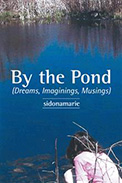
 |
Timeless words of wisdom."
By the Pond stirs the soul to life with a riveting collection of heartfelt poems that are not only central to the poet’s own life, but also relatable to the experiences of most of humanity. The therapeutic content of the poetry has a calming, trance-like effect. In fact, many of the metaphors revolve around the bipolar nature of water: at times, it can be silent and tranquil, and other times, it can become a violent storm threatening destruction. To understand the intricacies of this compilation, one must acknowledge life’s peaks and valleys, and the faith that keeps one from being lost in dreams or stuck in the ground. In the end, the message that loops endlessly is that of a hopeful existence.
Essentially, Sidonamarie’s poetry commences in reverse chronology, starting from the present and traveling back to the first poem in 1977. “With only Good,” the first poem prior to the start of section one, is both a lasting memory of the poet’s father and a compelling display of rhythm and figurative language.
In “Settling Dust,” personification is on full display as joy searches for respite amid the darkening clouds of sorrow. Another poem that captures the essence of this collection is “Clouds and Dreams (warrior poet),” which emphasizes that there is no time for “dawdling dreams,” but that one should be grounded by faith.
Each poem is imbued with evocative imagery and the poet’s conviction and fervor. Poems like “Poets/Painters (the gatekeepers), “Tears (death’s harvest),” and “Ripples” paint a vivid portrait in the reader’s mind and are must-reads.
The final section of poetry, “Poems for Parents and Their Children” is refreshing in its allusions to many relatable childhood experiences. The daily hustle and bustle of school is depicted playfully in “Rounding Up the Chicks,” and the ever-adventurous experience of Halloween night can’t be missed in “Ghosts of Halloween.” Overall, this collection both in theme and style is an ideal example of elegant and graceful poetry.
RECOMMENDED by the US Review